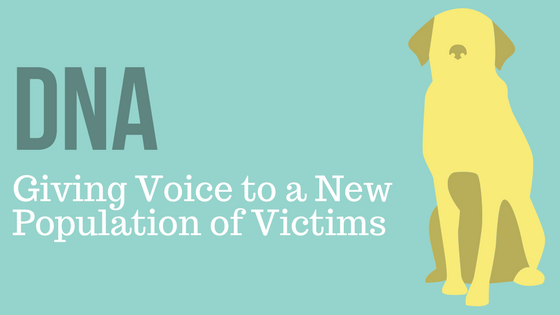She’s only two years old, but her face is a mass of deep cuts. Her left ear is torn almost completely off. Her right leg was broken a while back. It never healed right, and bends at an unnatural angle. She doesn’t put weight on it. There are puncture wounds on her neck. Her name might be Daisy, or Lola, or Chance. She’s a pitbull used for dog fighting. And she’s just one of countless victims of this illegal underground blood sport that is staged for the purposes of entertainment, gambling, status jockeying and sometimes just pure cruelty by what an ASPCA estimate puts at tens of thousands of people across the United States.
written by: Caroline Sober, Promega
Up until recently, the canine victims of this crime were largely voiceless. They lived with injury and pain. They charged into fights fueled by both instinct and the desire to please the very master who sent them into harm’s way for a few hundred bucks or an uptick in personal status. Most ultimately died, some mercifully via a bullet, others slowly and painfully, abandoned after losing a fight. But now, these victims have a small but very powerful ally: DNA.
We all know DNA is already a key component of helping human crime victims. It’s the witness that can speak when clues have dried up and other leads are exhausted, helping authorities track down and prosecute criminals who might have otherwise gone free. Now, a new canine DNA database known as the Canine CODIS (Combined DNA Index System) has been created at the University of California-Davis that does the very same thing: helps authorities and animal-rights groups investigate dog fighting cases and establish links between owners, breeders and dog fighting sites.
“Dog fighting is a multi-million dollar criminal enterprise that contributes to the cruel treatment and deaths of thousands of dogs nationwide every year,” says Tim Rickey, the ASPCA’s Senior Director of Field Investigations and Response. “This database is a vital component in the fight against animal cruelty and will allow us to strengthen cases against animal abusers and seek justice for their victims.”
The database started as a collaboration between the ASPCA, the Louisiana SPCA, The Humane Society of Missouri and researchers at the Veterinary Lab at UC Davis. An initial set of 400 samples were provided by the Humane Society of Missouri from dogs seized in July 2009 during the nation’s largest dog-fighting raid, where, after an 18-month investigation, at least 19 people across five states were arrested and 400 dogs bred for dog fighting rescued.
The Canine CODIS system contains individual DNA profiles of dogs seized during dog fighting investigations, sampled via cheek swab, and from samples collected at suspected fight venues called “pits.” Because the dogs used for fighting are often highly inbred for their fighting qualities, their bloodlines allow for very specific tracing across generations. “We can tie blood spatter on pit walls and clothing, or blood trails found outside of the pit, to a specific dog and tell his story for him,” says Beth Wictum, director of the forensics unit of the Veterinary Genetics Laboratory at the UC Davis veterinary school. “We become the voice for those victims.” And, because the database includes more DNA markers than are normally tested, it allows for better comparisons and more powerful DNA match probability calculations. This can directly lead to more compelling evidence being available for court cases against members of suspected dog fighting operations. It tells the story. It gives voice to the voiceless. And, as a dog owner and lover, I am extremely grateful for its existence.
For more information on the Canine CODIS database, you can visit the ASPCA or the UC Davis Veterinary Genetics Laboratory.
References
- “Dog-fighting DNA database established to help crack down on animal cruelty.” June 16, 2010. PhysOrg.com.
- “National Forensic Canine DNA Database To Help Combat Dogfighting.” June 17, 2010. PopSci.com.
- “Proof of a crime may be in a dog’s DNA.” June 23, 2010. CNN.com.
- “ASPCA launches dog fighting DNA database.” June 21, 2010. Philly.com
- Dog Fighting FAQ. ASPCA.org
WOULD YOU LIKE TO SEE MORE ARTICLES LIKE THIS? SUBSCRIBE TO THE ISHI BLOG BELOW!


